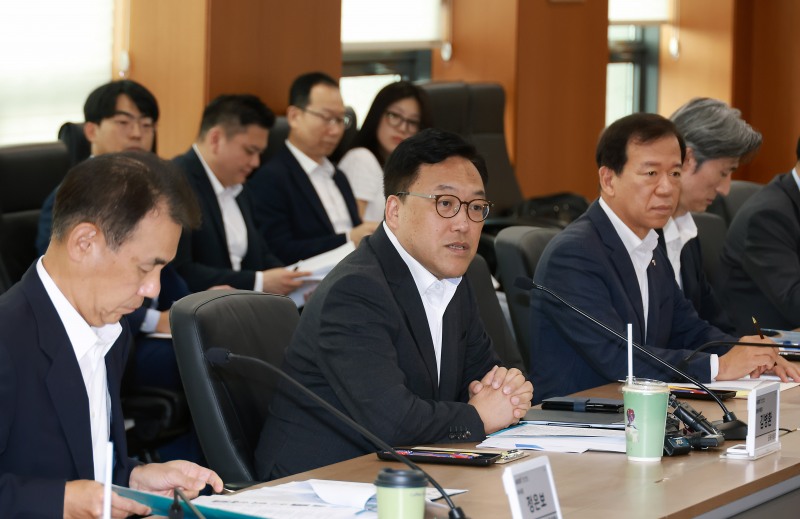 이미지 확대보기
이미지 확대보기According to the financial sector, Kim will meet with bank chiefs to discuss major issues. CEOs of five major banks, including KB, Shinhan, Hana, Woori, and NH, as well as regional banks, foreign banks, and internet banks, are expected to attend. The meeting will be Kim's first event with the financial sector in about three weeks after his inauguration on the 31st of last month.
As it is the first time to officially meet with representatives from each business sector, attention is being paid to Chairman Kim's message to the industry. Chairman Kim is expected to first ask for cooperation in managing household debt, which has been rapidly increasing recently. Before taking office, Chairman Kim has announced his plan to put "financial market stability" as a top priority.
After taking office, he announced his plan to quickly address the four major risk factors in the financial market, including ▲ household debt ▲ real estate PF ▲ small business owners and self-employed debt ▲ secondary financial sector soundness. According to financial authorities, household loans in the financial sector increased by 5.3 trillion won (4.3 billion U.S. dollars) in total at the end of last month, widening the increase from 4.2 trillion won (4.1 billion dollars) in the previous month. The growth has been on the rise for four consecutive months since April.
The financial authorities plan to implement the goal of managing household loan growth within the nominal GDP growth rate through communication with related ministries and the financial sector without a hitch, and establish a loan practice that borrows within the repayment capacity and pays off by dividing it from the beginning through the stress total debt repayment ratio (DSR).
Earlier, Chairman Kim said in his inauguration speech, “In the case of household debt, we will vigilantly and thoroughly manage it by preparing a detailed contingency plan in advance to prevent risks from escalating amid expectations of interest rate cuts and the recovery of the real estate market.”
It is also expected to order strengthening internal control over a series of financial accidents, including inappropriate loans from Woori Bank, which were recently revealed by the Financial Supervisory Service's inspection. The Financial Supervisory Service(FSS) said on the 9th that it found that Woori Bank executed a total of 42 loans worth 61.6 billion won from April 3, 2020, to the relatives of former Woori Financial Group Chairman Sohn Tae-seung and related borrowers. Of these, 28 cases (35 billion won) were found to have been improperly treated without following usual standards and procedures.
It is also expected to call for the introduction and effective implementation of the accountability structure to prevent financial accidents. The accountability structure map is a system that specifies who is responsible for major tasks of a financial company in advance so that internal control responsibilities cannot be delegated to subordinates. Financial holding companies and banks are required to submit the accountability structure to the financial authorities by January 2 next year, and financial investment companies (securities firms) and insurance companies by July 2, 2026 at the latest, depending on their asset size.
In order to introduce the accountability structure early, the financial authorities have decided to reduce or exempt sanctions for companies that submit their accountability structure by the end of October and self-detect and correct violations of the law by their employees during the pilot period (November this year to early January next year).
It is also expected to request support measures for vulnerable groups such as small business owners and self-employed people. Chairman Kim held a meeting with small business owners and self-employed people on the 1st as his first move since taking office and said, "We will discuss additional ways to support small business owners with private financial institutions such as banks." Last month, the government announced measures to increase the size of the New Start Fund, a small business debt adjustment support program, from 30 trillion won to 40 trillion won + α, and extend the period subject to debt adjustment to the first half of this year. The Financial Services Commission will also come up with a "plan to improve support for ordinary people and self-employed people" and announce and push for it during the third quarter.
At his confirmation hearing, Chairman Kim also expressed his intention to consider extending the loan maturity and delaying interest repayment measures in consideration of the burden on small business owners and self-employed people to repay interest due to prolonged high interest rates. Since April 2020, financial authorities have implemented measures to extend and repay loans to small and medium-sized companies and small business owners affected by COVID-19. There are 286,100 borrowers using the COVID-19 maturity extension program, and the balance of loans is 57.92 trillion won, which will mature in September next year.
It is expected to focus on real estate PF soft landing plans and soundness issues with the second financial business, including credit business companies and savings banks. Financial companies submitted plans to organize real estate PF evaluation workplaces by the 9th, which received "significant" or "concern of insolvency" ratings, according to the FSS order. The FSS will conduct on-site inspections of financial companies that have insufficiently submitted plans to deal with insolvent PF workplaces.
Initially, the Financial Supervisory Service expected 2~3% of the 230 trillion won real estate PF workplaces to be sold at light or short sale, but the actual size of workplaces subject to liquidation is said to have increased further as the delinquency rate increases. The delinquency rate of PF loans in the financial sector was 3.55% as of the end of March, up 0.85 percentage points from the end of last year (2.7%). In particular, the delinquency rate of PF loans at savings banks jumped 4.3 percentage points from 6.96% to 11.26% during the same period.
There is also a possibility of emphasizing the social responsibility of the financial sector to credit business companies in relation to the recent non-settlement of Timon and Wemakeprice. There may be discussions on measures related to the burden of losses, such as support for refunds from credit card companies.
Chairman Kim will discuss the strategies and tasks for insurance reform prepared by the insurance industry and the Insurance Reform Council. The Financial Services Commission plans to prioritize life-like tasks such as reducing insurance complaints and hold monthly meetings until the end of the year to review 10 strategies and 60 detailed tasks. It will also discuss with the securities industry the need to abolish the financial investment income tax, which is scheduled to be implemented in January next year.
Han Aran (aran@fntimes.com)
가장 핫한 경제 소식! 한국금융신문의 ‘추천뉴스’를 받아보세요~
데일리 금융경제뉴스 Copyright ⓒ 한국금융신문 & FNTIMES.com
저작권법에 의거 상업적 목적의 무단 전재, 복사, 배포 금지













![용산구 ‘나인원한남’ 88평, 9억 상승한 167억원에 거래 [일일 아파트 신고가]](https://cfnimage.commutil.kr/phpwas/restmb_setimgmake.php?pp=006&w=284&h=214&m=5&simg=2025071010042800278b372994c952115218260.jpg&nmt=18)

![‘강북 핵심’ 마포구청장 선거전 점화…박강수vs유동균, 노웅래 등판하나 [6·3지방선거]](https://cfnimage.commutil.kr/phpwas/restmb_setimgmake.php?pp=006&w=284&h=214&m=5&simg=2026022717132407974b372994c951245313551.jpg&nmt=18)


![조직력·행정경험·상징성…동작구청장 승부 가를 인물은? [6·3지방선거]](https://cfnimage.commutil.kr/phpwas/restmb_setimgmake.php?pp=006&w=284&h=214&m=5&simg=2026022015494405730b372994c951245313551.jpg&nmt=18)
![‘강북 핵심’ 마포구청장 선거전 점화…박강수vs유동균, 노웅래 등판하나 [6·3지방선거]](https://cfnimage.commutil.kr/phpwas/restmb_setimgmake.php?pp=006&w=110&h=79&m=5&simg=2026022717132407974b372994c951245313551.jpg&nmt=18)
![조직력·행정경험·상징성…동작구청장 승부 가를 인물은? [6·3지방선거]](https://cfnimage.commutil.kr/phpwas/restmb_setimgmake.php?pp=006&w=110&h=79&m=5&simg=2026022015494405730b372994c951245313551.jpg&nmt=18)
![현직 복당설 속 전문성·공천 경쟁…용산구청장 선거 3大 변수 [6·3지방선거]](https://cfnimage.commutil.kr/phpwas/restmb_setimgmake.php?pp=006&w=110&h=79&m=5&simg=2026021317461705072b372994c951245313551.jpg&nmt=18)
![서울 영등포구, ‘현역 성과론’ vs ‘세대교체 탈환론’ 격돌 [6·3지방선거]](https://cfnimage.commutil.kr/phpwas/restmb_setimgmake.php?pp=006&w=110&h=79&m=5&simg=2026021117121107536048b718333211177233133.jpg&nmt=18)
